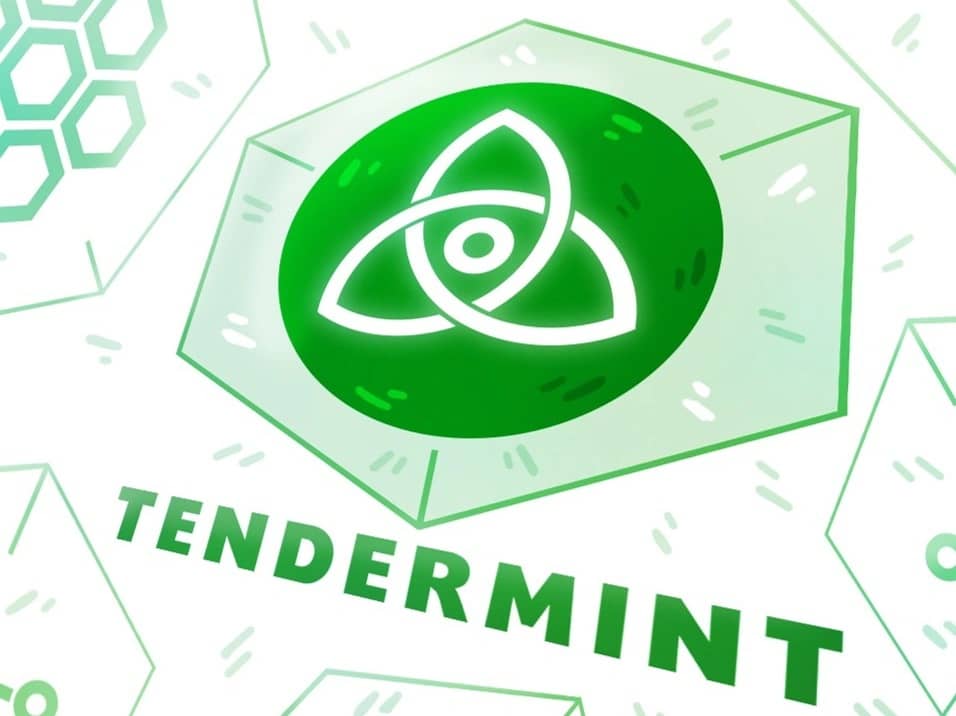Subscribe to wiki
Share wiki
Bookmark
Tendermint
The Agent Tokenization Platform (ATP):Build autonomous agents with the Agent Development Kit (ADK)
0%
Tendermint
Tendermint is a Byzantine Fault Tolerance (BFT) consensus mechanism that allows applications to launch across different machines securely and consistently[1].
Origins
Tendermint was founded by Jae Kwon. He started working on the project in 2014 and introduced the concept of the Tendermint consensus algorithm around that time. Ethan Buchman then joined Kwon as a co-founder in 2015 after the two met at the Cryptocurrency Research Group and Crypto-economics Conference. Tendermint developed Cosmos ecosystem, an open-source interchain network, a cryptocurrency application, that allows different blockchains, called zones, to communicate and exchange data, all connected by the Cosmos Hub which is powered by the Atom token.[5][16]
In 2016, Jae Kwon and Ethan Buchman published the Cosmos whitepaper: 'Cosmos: A Network of Distributed Ledgers'. Later that year, Cosmos won the Shanghai International Blockchain Week 'Most Innovative Project' award, and Tendermint won the contract to run the first BFT blockchain voting system for the Rock and Roll Hall of Fame in Cleveland, Ohio. [6]
Later in 2016, the InterChain Foundation (ICF) was formed to support the development of Cosmos and engaged Tendermint to build Cosmos. In 2017, the ICF raised $16.8 million for Cosmos within thirty minutes, making it one of the most successful blockchain-based fundraising events in history.[5]
Overview
The first official release of the Tendermint software was in 2015. The project aimed to provide a Byzantine Fault Tolerant (BFT) consensus algorithm that could address some of the limitations of traditional proof-of-work and proof-of-stake mechanisms, and to enable faster and more secure consensus for various distributed applications, including blockchains. Jae Kwon stepped down as the company’s CEO in 2020 to focus on Gno.land, his competitor to Ethereum.
Tendermint has helped drive Cosmos from inception and launch the Inter-Blockchain Communication (IBC) protocol in 2021. In under 10 months, 38 separate blockchains have adopted the Cosmos approach for blockchain interconnectivity, leading to over 9.2 million IBC transactions monthly.[11]
In February 2022, Tendermint rebranded to Ignite. Tendermint also announced that it would transition all Cosmos marketing and community initiatives and channels to the ICF. On February 23, 2022, it was announced on the official website of Ignite:
Effective today, All in Bits, Inc., DBA “Tendermint”, the founding team of the Cosmos ecosystem and leading developer of innovative tools for Web 3, will operate under the trademark, “Ignite” with a new, energized brand.
A new entity name, corporate brand, brand logo, and brand identity have been developed to represent the inclusivity and diversity of Ignite’s evolved vision and mission. Peng Zhong, CEO of Ignite, said:
The world is at an inflection point where accelerated growth in the Web 3 space will eventually see mass adoption of decentralized services in our everyday lives. We believe it is time to expand our focus to bring more people and organizations into this world. What we are developing are the necessary tools for individuals and organizations that will let them engage with and build innovative global communities. Our new brand represents the change we inspire by connecting everyone to this new world of decentralization and interoperability.
[3][10]
A few months later, in May 2022, Tendermint announced the creation of two independent entities: Ignite and NewTindermint. Both two entities hold complete independence from each other, with their own team, equity, and funds.[4]
NewTendermint Inc.
NewTendermint Inc., has the co-founder of the original Tendermint, Jae Kwon, holding the position of CEO. NewTendermint focuses on contribution to the Cosmos ecosystem core technology. Its team works on Kwon’s project, Gno.land, Tendermint2 project, and Cosmos SDK. Gno.land is a smart contracting platform, designed especially for wide-scale developer adoption, with the ambition to ultimately compete with Ethereum. NewTendermint creates and provides the infrastructure for global-scale intelligent human coordination based on core principles of human liberty and public accountability.
Kwon states:
NewTendermint will lead the development of Tendermint2 and Gno.land, which is the best contender to Ethereum. Ultimately, we want to provide this technology to the world, for everyone to benefit from publicly accountable DAOs and censorship resistant communication.[4]
Ignite Inc.
Ignite Inc. CEO Peng Zhong said he would be continuing on its growth path since the official rebranding. Product development remains the focus of this entity, with Ignite CLI and Emeris as flagship products, for developers and end users respectively.
Peng Zhong asserts:
We recognise the necessity for independence so that shipping our products can be prioritized. With an independent company, we are now in the best position to be fully dedicated to product development and capital raising, which will accelerate our growth.[4]
Tendermint Products
Tendermint was a core contributor to the Cosmos Network and created the Tendermint Core, Application BlockChain Interface (ABCI), and Cosmos SDK.[2]
Tendermint Core
Tendermint Core is the actual software the company Tendermint works on. Tendermint Core is a consensus engine and is powered by the Byzantine Fault Tolerant (BFT) consensus model. The BFT model can tolerate less than one-third of the Byzantine validators to reach consensus, which means Tendermint Core tolerates up to one-third of machines failing arbitrarily, including explicitly malicious behavior.[9]
Tendermint Core can also be used to replicate deterministic state machines onto computers anywhere. With it, a transaction is immediately finalized once it is included in a block, without any need for confirmation.[10]
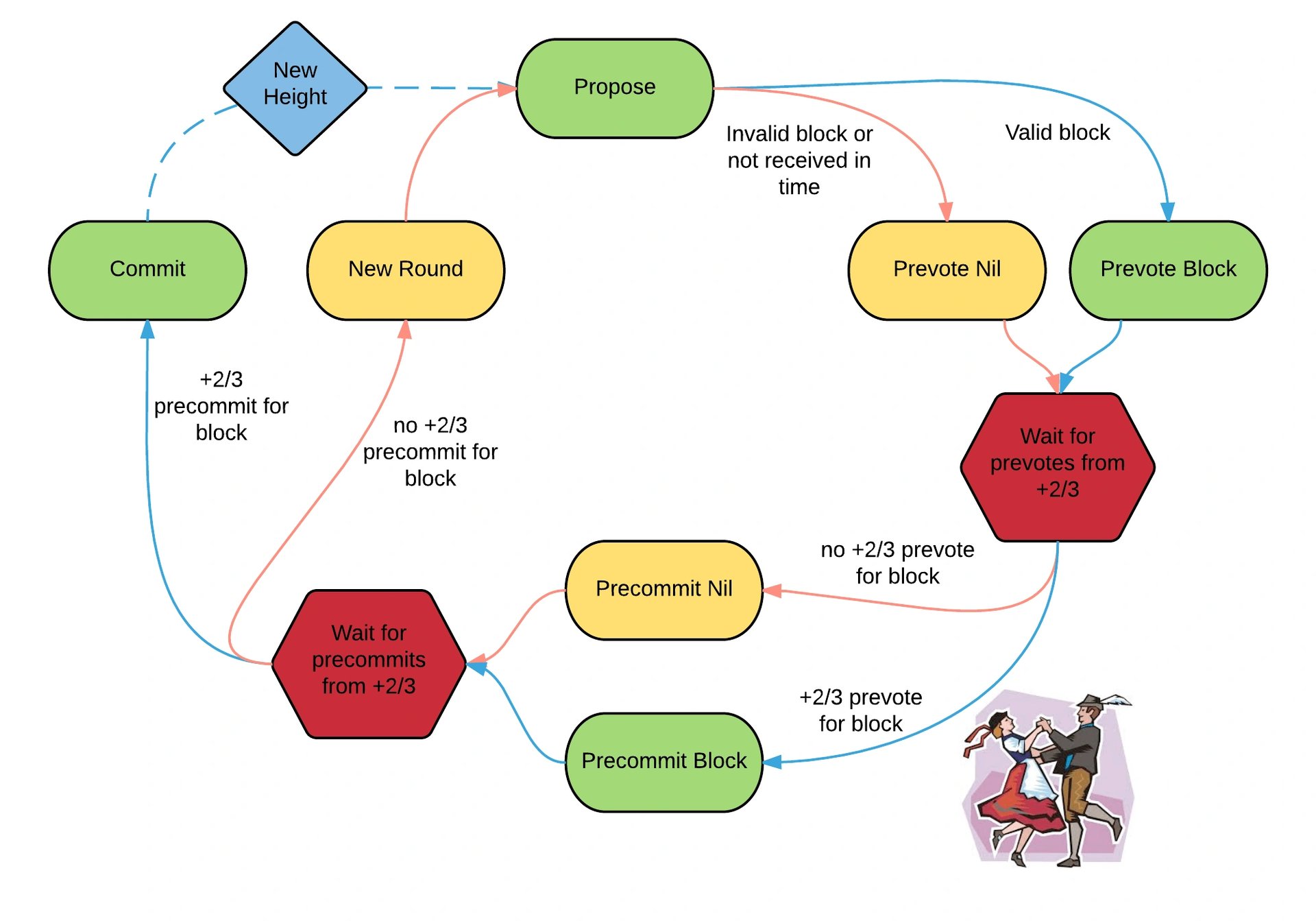
ABCI
ABCI (Application BlockChain Interface) is a set of ready-to-use methods for connecting the consensus engine to the application layer logic. Therefore, ABCI is the main component of the networking layer, and all the messages and transactions should be channeled through the ABCI.
With the ABCI protocol, Tendermint Core supports state machines written in any programming language, making it possible for developers to choose a language that fits their needs. [2][9][10]
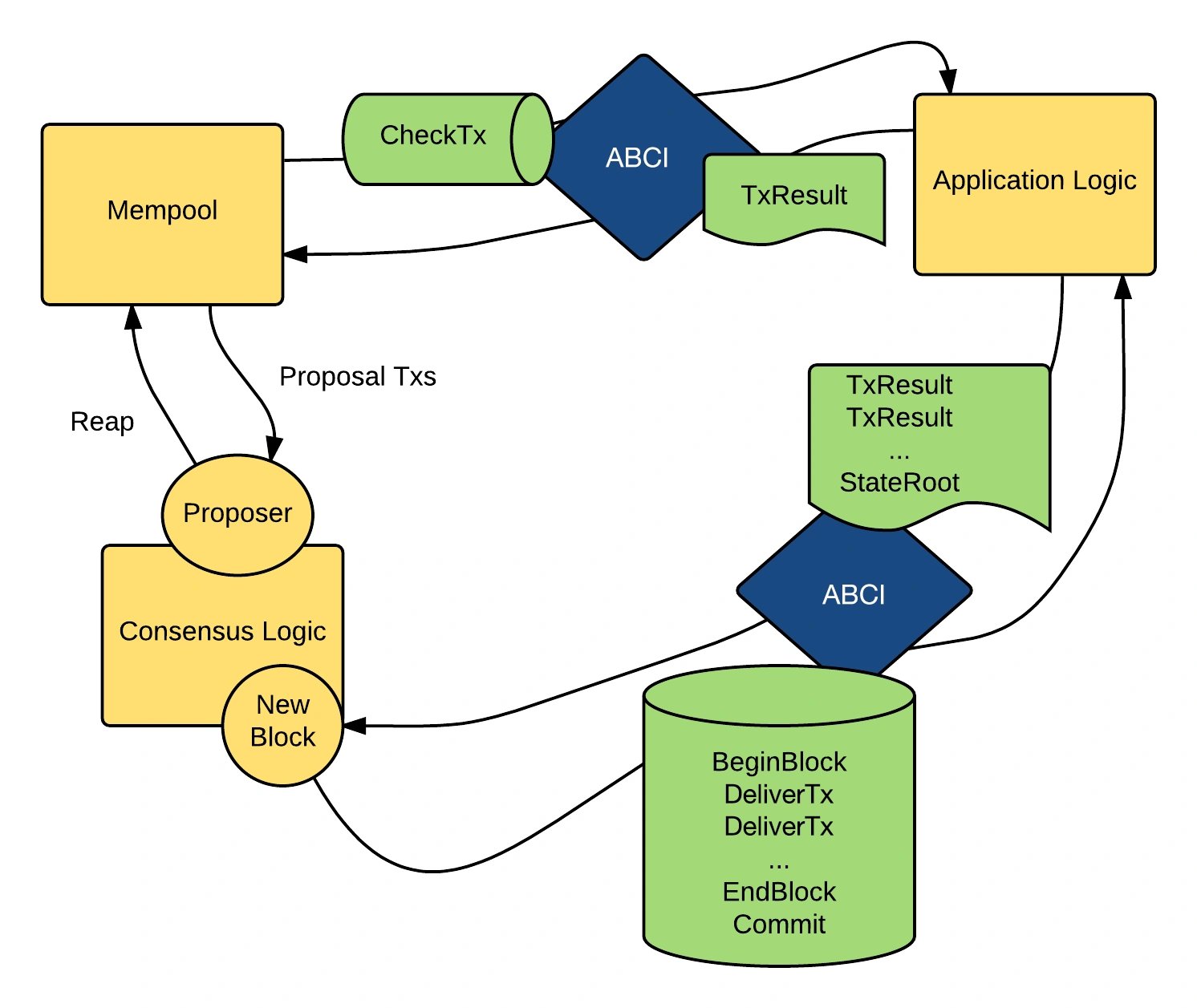
Cosmos SDK
The Cosmos network is an ecosystem of blockchains that can scale and interoperate with each other. Cosmos is a layer-1 blockchain with three layers:
- An application layer for processing transactions and maintaining the network state.
- A networking layer for relaying communication between the transactions and the chain.
- A consensus layer for determining the state of the network.[14]
Cosmos SDK is a set of tools and frameworks that developers can use to build the application logic layer of a blockchain for the Cosmos network. It simplifies the process of building secure blockchain applications on top of Tendermint Core. Developers can use Cosmos SDK in conjunction with Tendermint Core and Application Blockchain Interface (ABCI) to leverage the existing functionalities of the consensus engine and networking layer of a blockchain.
Cosmos SDK also uses the Interblockchain communication (IBC) protocol, so developers can build a blockchain of blockchains. Cosmos SDK has ready-to-use modules that developers can use in the application logic layer, including transactions, storage, cryptography, governance, tokens, wallets, and balances, i.e., the Cosmos SDK is the implementation of the ABCI and stands for the modular part of the Cosmos ecosystem. [8][10]
For instance, a developer team could choose to build a new DApp for decentralized finance. It could use the Cosmos SDK as a plug-and-play option to build a decentralized app compatible with Cosmos and other IBC chains. It would be connected to the Tendermint Core consensus mechanism through the ABCI. [14]
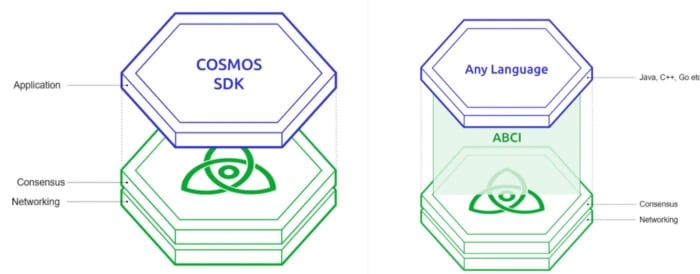
Binance Chain is built on forks of Tendermint Core and Cosmos SDK. This integration enhances the speed and efficiency of transactions.[7][10] KAVA, Band Protocol, Terra, and IRISnet were also built with Cosmos SDK.[13]
Features
Byzantine Fault Tolerance
Tendermint's BFT algorithm guarantees a high level of security and resilience against malicious actors. This is crucial for applications requiring trust and transparency, such as financial systems and supply chain management.[12]
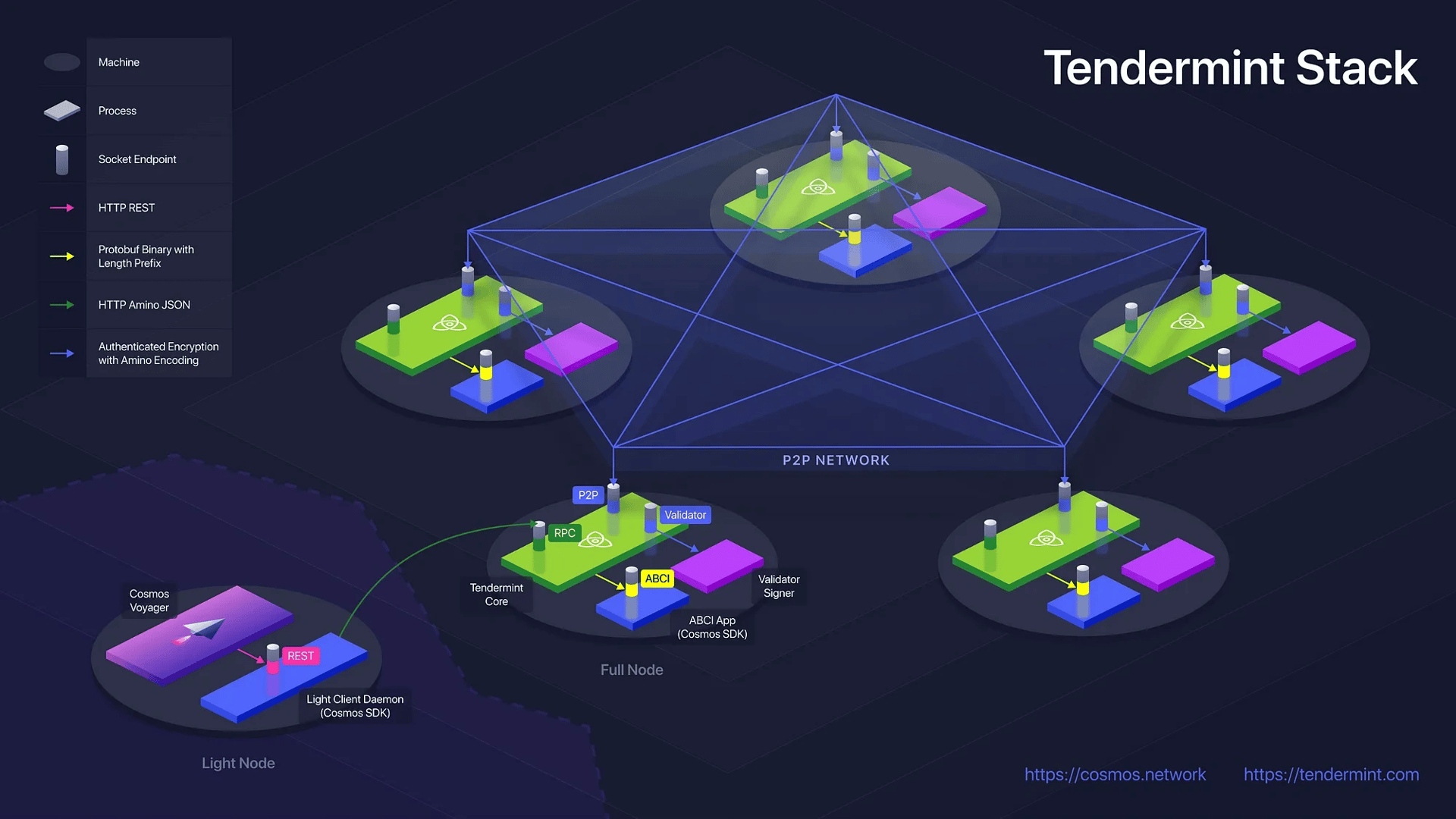
Fast Finality
Unlike traditional proof-of-work blockchains that require multiple confirmations, Tendermint achieves fast finality. Once a block is added to the blockchain, it becomes irreversible, reducing the risk of chain reorganizations and double-spending.[12]
Modular Architecture
Tendermint's modular architecture separates the consensus layer from the application layer. This flexibility allows developers to experiment with various application logic while benefiting from the robust consensus mechanism.[12]
Interoperability
Tendermint's consensus mechanism can be used for permissioned ledgers, public and private chains, and more, enhancing its applicability.[12]
Validator Set and Incentives
Tendermint networks operate with a set of validators who propose and validate new blocks. Validators are selected based on a staking mechanism, ensuring that those with a vested interest in the network's security are responsible for maintaining it.[12]
See something wrong?
The Agent Tokenization Platform (ATP):Build autonomous agents with the Agent Development Kit (ADK)
